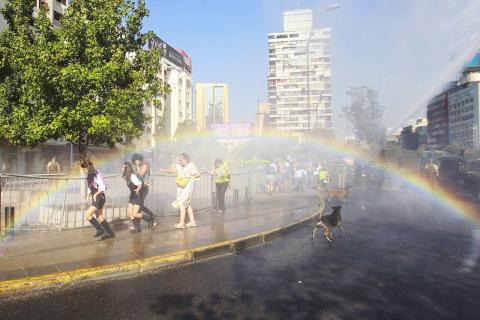At least 50 people were arrested in Santiago on Thursday when police clashed with students angry at the low quality and high cost of public education. The demonstration, involving about 5,000 protesters, also saw three officers hurt in the clashes, police said.
Police used water cannons and tear gas against the demonstrators and deployed officers on horseback to try to control the crowd. The students responded by hurling stones, sticks and bottles filled with paint.
Some of the demonstrators, wearing hoods to mask their identity, lit fire to barricades on Alameda Avenue, a main downtown avenue, and sought to halt traffic in central Santiago.

Photo: Reuters
The protesters did not have an official permit to march and clashes erupted when police moved in to break up the demonstration.
Chilean Education Minister Harald Beyer called the clashes “quite incomprehensible” and said the violence was not consistent with “the spirit of the establishments of the country.”
Chilean students staged more than 40 street marches last year. Some of them drew more than 100,000 people, making them the country’s largest rallies since the end of former Chilean president Augusto Pinochet’s dictatorship in 1990. Several marches resulted in clashes with police.
The students, backed by professors and labor unions, are demanding that Chilean President Sebastian Pinera’s conservative government overhaul the education system to guarantee free, quality public -education for all Chileans.
Under Pinochet, state funding for public education was slashed, privatization encouraged and responsibility for public schools passed to municipalities.
The result has been a system dividing those who can afford private schools and those who are relegated to lower quality public schools, or benefit from public schools in wealthy neighborhoods.
Amnesty International this week expressed concern over what it called “the human rights violations” and reports of excessive force from authorities over the last year of protests.
Last year, more than 5,000 people were arrested while taking part in protests, most of whom were released within hours and not charged because of a lack of evidence of crimes.

POLITICAL PRISONERS VS DEPORTEES: Venezuela’s prosecutor’s office slammed the call by El Salvador’s leader, accusing him of crimes against humanity Salvadoran President Nayib Bukele on Sunday proposed carrying out a prisoner swap with Venezuela, suggesting he would exchange Venezuelan deportees from the US his government has kept imprisoned for what he called “political prisoners” in Venezuela. In a post on X, directed at Venezuelan President Nicolas Maduro, Bukele listed off a number of family members of high-level opposition figures in Venezuela, journalists and activists detained during the South American government’s electoral crackdown last year. “The only reason they are imprisoned is for having opposed you and your electoral fraud,” he wrote to Maduro. “However, I want to propose a humanitarian agreement that

ECONOMIC WORRIES: The ruling PAP faces voters amid concerns that the city-state faces the possibility of a recession and job losses amid Washington’s tariffs Singapore yesterday finalized contestants for its general election on Saturday next week, with the ruling People’s Action Party (PAP) fielding 32 new candidates in the biggest refresh of the party that has ruled the city-state since independence in 1965. The move follows a pledge by Singaporean Prime Minister Lawrence Wong (黃循財), who took office last year and assumed the PAP leadership, to “bring in new blood, new ideas and new energy” to steer the country of 6 million people. His latest shake-up beats that of predecessors Lee Hsien Loong (李顯龍) and Goh Chok Tong (吳作棟), who replaced 24 and 11 politicians respectively

Young women standing idly around a park in Tokyo’s west suggest that a giant statue of Godzilla is not the only attraction for a record number of foreign tourists. Their faces lit by the cold glow of their phones, the women lining Okubo Park are evidence that sex tourism has developed as a dark flipside to the bustling Kabukicho nightlife district. Increasing numbers of foreign men are flocking to the area after seeing videos on social media. One of the women said that the area near Kabukicho, where Godzilla rumbles and belches smoke atop a cinema, has become a “real

‘WATER WARFARE’: A Pakistani official called India’s suspension of a 65-year-old treaty on the sharing of waters from the Indus River ‘a cowardly, illegal move’ Pakistan yesterday canceled visas for Indian nationals, closed its airspace for all Indian-owned or operated airlines, and suspended all trade with India, including to and from any third country. The retaliatory measures follow India’s decision to suspend visas for Pakistani nationals in the aftermath of a deadly attack by shooters in Kashmir that killed 26 people, mostly tourists. The rare attack on civilians shocked and outraged India and prompted calls for action against their country’s archenemy, Pakistan. New Delhi did not publicly produce evidence connecting the attack to its neighbor, but said it had “cross-border” links to Pakistan. Pakistan denied any connection to